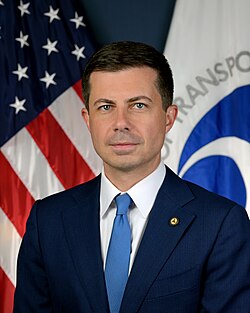Pete Buttigieg Explains DEI to Regular Folks
And I explain to you why DEI is mostly wrong
I like Pete Buttigieg. I will likely vote for him if he runs for president in 2028, but I disagree with him about Diversity, Equity, and Inclusion (DEI).

I’m writing this because I want democrats to stop screwing up so badly. I think the Republican party has lost its way, which leaves Democrats as our only hope. Unfortunately, the Democratic party (and seemingly America1) is in sad shape. To quote from Jeff Daniels' character in the American TV series The Newsroom:2
“You know why people don’t like liberals? Cause they lose.
If liberals are so fucking smart, how come they lose so god damn
always?”
I want Democrats to stop losing so god damn always.
Here, for example, is how Pete Buttigieg Explains DEI to Regular Folks3
Transcript, Pete Buttigieg speaking
“First of all, DEI stands for diversity, equity, and inclusion, right?”
“So to me we start by thinking okay, what’s the opposite of those things?”
“The opposite of diversity is uniformity, right?”
Context matters.
When it comes to hiring someone for a job, the opposite of diversity might be ‘color blind’.
And in some situations diversity is a weakness, not a strength.
For example, anyone who has dealt with Customer Support from a non-native English speaker knows the importance of clear communication. Sometimes I just want to say, “Oh my gosh, please… give me more uniformity!”
The usual and obvious counter example to ‘diversity’ are the players in the NBA (National Basketball Association). 70% of NBA players are Black (or African American). Do we need more Asians and Native Americans on our basketball teams in the name of diversity? I don’t think so. Why would skin color, shoe size, or sexual orientation matter when shooting a free throw? And if it doesn’t matter when shooting a free throw, then why would it matter when tightening bolts on a factory assembly line, or when pouring coffee at Starbucks?
I think when DEI proponents say ‘diversity’ that’s actually shorthand for ‘social engineering.’ They want to fix society’s discrimination problem, and forced diversity is their proposed way to do that. But there’s very little rhyme or reason to the proposed solution. Not to mention the cost of giving someone an advantage because they’re Black, or White, or Asian, or gay, or whatever. The whole point of working towards a non-discriminatory society is to stop treating people by their accidental and mostly irrelevant group characteristics, and, instead, treat everyone as an individual.
“The opposite of equity is inequity.”
For example, if SOMEGROUP MEMBERS are 5% of the population, then DEI proponents presume that in an ’equitable’ society we would expect to see 5% of SOMEGROUP MEMBERS distributed proportionally throughout the workforce.
But why this type of distribution should be expected is assumed but never explained. Why do we expect all GROUPS to be equally proportionally distributed?
One reason GROUPS might not be equally proportionally distributed is because – statistically speaking – different groups have different strengths and weaknesses.
Culture, for example, plays a significant part in outcomes (again, statistically speaking).
For example, the usual study time for Asian students can be as high as 10 hours per day. Whereas American students study for a whopping 1-2 hours. Regardless of the percentage of the population, which group do you think will do better on knowledge tests?
Does it follow, then, that if the number of Asian students with highly technical and great paying jobs exceeds the proportional distribution of American students with highly technical and great paying jobs, that that’s somehow ‘inequitable’? Do we need to fix society because when Asian kids grow up they do better then White kids?
These different definitions of ’equity’ are often described as the difference between “equal opportunity” and “equal outcome”.
Equal opportunity is the very definition of fairness: everyone plays by the same rules, every one gets a fair chance. Equal outcome, on the other hand, is social engineering writ large. Equal outcome adherents basically want to play god; they want to fix society to be the way it should be.
There are several problems with ’equal outcome.’ First, not everyone agrees there is a problem to be solved. Second, not everyone agrees on the best way to fix the problem. And third, sometimes the best of intentioned solutions have unforeseen side effects resulting in even bigger problems.
“And the opposite of inclusion is exclusion.”
Yes, we do not want to exclude anyone unfairly. That’s what equal opportunity means. But the opposite of exclusion (i.e., inclusion), can also be taken to extremes, which may be even worse. Exclusion is doing a bad thing for bad reasons; over-including is doing a bad thing for good reasons, thus blinding ourselves to the harm being done under the guise of moral good.
For example, as previously mentioned, we don’t want to force Asians to be included in the NBA just because Asians are proportionally underrepresented population-wise.
“And I don’t know a lot of people who think we’d be better off if our lives had more uniformity, inequity, and exclusion, right?”
Roughly half of the country voted for the anti-DEI candidate in 2024.

I don’t think DEI means what you think they think it means.4
“But I think part of why people have questions about it, that I respect, is they’re not sure if this is they’re worried about fairness, right?”
“So to me when you talk about some of these policies the idea is to make sure everybody gets a seat at the table, especially if you know there have been systematic ways of keeping people from getting a seat at the table over the years, sometimes based on their race, on their religion, on their income, on their background, any number of reasons. Sexuality, right?”
“Like a lot of different reasons, and it’s about making sure that what we do going forward is fair.”
The biggest DEI misfire is probably this.
There are not an infinite number of seats at the table. Resources are always limited – time, money, employees. If employers could hire everyone, then sure, ’everybody gets a seat at the table.’ But that’s not possible, it’s not reality. So we have to make choices. How do we choose? Some people feel that using skin color as a criteria is a decidedly unfair and hence bad way to choose.
Given two identically qualified candidates, one White and one Black, it would seem more fair to decide between them by simply flipping a coin, as opposed to preferring one skin color (or race or religion or sexuality or whatever) over another skin color, especially when one’s skin color is not something one chooses, and when one’s skin color has nothing to do with the job at hand.
“And this can be an economic issue, too.”
“You look at something like redlining. A lot of homeowners, families would be homeowners, especially black families, couldn’t get homes in certain neighborhoods where the property value started to go up, so even if that happened to a family, I don’t know 50 years ago, their kids are living with the consequences of that now because their family has less wealth because they were kept out of a neighborhood where property values were growing, right?”
If you’re born rich, generally you do better. If you’re born tall or beautiful, you generally do better. If your culture encourages you to work hard, you’ll likely do better than someone in similar circumstances who works less hard. And then there’s luck, which trumps all.
What responsibility do people today have for events of the past, when people today had no control over what happened in the past? None.
Do we want to work towards making things more fair, in the sense of treating everyone equally? Yes. That’s why we strive to eliminate redlining and jettison Jim Crow laws.
Are there still bigots and racists and homophobes in our midst. To be sure, and there probably always will be. Humans are weird and diverse!
Nevertheless, one’s unlucky heritage is not a good enough excuse for penalizing innocents in the present.
So you weren’t born rich. You’re short and not too attractive. You watch TV instead of studying for a test. Your black parents couldn’t get a home in a certain neighborhood. Guess what, you’re unlucky. Welcome to the human race.
Will you succeed?
That’s up to you. Any excuse will do.
“And so part of it’s the idea that some of these things may have started a long time ago. Maybe nobody alive today is responsible for some of the injustice that has shaped what it’s like to live in this country right now, but all of us now are responsible for doing something about it.”
The English proverb, “Don’t cry over spilt milk,” was first recorded in the 17th century.
Today, it seems, DEI not only wants to cry over past spilt milk, it wants to use past injustices to justify spilling new milk today; as if spilling new milk today will magically “unspill” the milk of the past.
No amount of whining or virtue signaling can redo the past. What do we do instead? In the case of slavery, we clean up and move on, which is what we’ve been trying to do ever since the Civil War, the deadliest war in American history.
Of course I could be mistaken. If so, please Democrats, explain it to me. For the sake of the country.
-
Good acting, excellent writing, a demonstration of the power of storytelling. “The Newsroom - America is not the greatest country in the world anymore…” https://www.youtube.com/watch?v=wTjMqda19wk 4:48 ↩︎
-
QUOTES: Jeff Daniels plays Will McAvoy https://www.imdb.com/title/tt2289479/characters/nm0001099 ↩︎
-
Pete Buttigieg explains the purpose of DEI to regular folks https://www.youtube.com/watch?v=bx62pk3kwf8 ↩︎
-
The Princess Bride - Inconceivable! (1987) https://www.youtube.com/watch?v=D9MS2y2YU_o ↩︎